|
|
|
Sort Order |
|
|
|
Items / Page
|
|
|
|
|
|
|
| Srl | Item |
| 1 |
ID:
146785
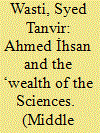

|
|
|
|
|
| Summary/Abstract |
In the past, weekly journals often served as the primary vehicle for the publication and dissemination of high-quality literature. Novels and plays were often serialized in such periodicals, which also featured items of poetry, essays and even political analysis. The Turkish weekly Servet-i Fünun [Wealth of the Sciences] which began publishing in 1891 and closed down in 1944 attracted contributions from the best Turkish writers of its time, and its very name became a banner for new currents in Turkish literature, whether poetry or prose. Part of its success was due to the single-minded labours of its founder and editor, Ahmed İhsan, a journalist and novelist of distinction. The article attempts to assign to the journal and its editor their proper place within the history of Turkish literary journalism.
|
|
|
|
|
|
|
|
|
|
|
|
|
|
|
|
| 2 |
ID:
114872
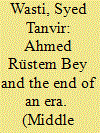

|
|
|
|
|
| Publication |
2012.
|
| Summary/Abstract |
Ahmed Rüstem Bey was accredited as Ottoman Ambassador to the United States of America at a critical juncture before the First World War. The Ottoman Empire had weakened as a result of revolts by many minorities agitating for self-determination and a series of military conflicts culminating in the Balkan Wars. Ahmed Rüstem Bey, though born in Turkey of non-Turkish parentage, was a dyed-in-the-wool Ottoman who felt deeply attached to his country. As Ambassador his stay in the US was short and controversial. Information on Ahmed Rüstem's life and career needs augmentation, and the present article represents an initial attempt to portray this unconventional diplomat.
|
|
|
|
|
|
|
|
|
|
|
|
|
|
|
|
| 3 |
ID:
084072
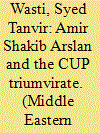

|
|
|
|
|
| Publication |
2008.
|
| Summary/Abstract |
Amir Shakib Arslan was a Druze aristocrat and one of many loyal non-Turkish Ottomans who were in the forefront of the political and cultural scene in the final years of the Ottoman empire. As a poet, author, journalist and Ottoman deputy, he chronicled the political events of the time in which he took part. Amir Shakib Arslan had friendly personal relations with the triumvirate of Talat, Enver and Cemal pashas. As such, he was able to penetrate into the inner circles of the Committee of Union and Progress (CUP) and offer support as well as salutary advice.
|
|
|
|
|
|
|
|
|
|
|
|
|
|
|
|
| 4 |
ID:
120848
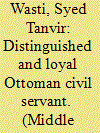

|
|
|
|
|
| Publication |
2013.
|
| Summary/Abstract |
The nineteenth century represented an important period in the attempts of Ottoman Turkey to bring all its institutions, civil and military, up to date so as to be able to prevent disintegration of the empire. The Ottoman civil service bureaucracy became an efficient part of this modernizing process. Hüseyin Nâzim Pasha, who served both as minister and governor of major provinces, provides an important example of Young Ottoman thought, loyal but forward-looking, steeped in tradition but not blindly bound by it, industrious and well able to represent the changing face of Turkey in both the private and the public spheres. His life represents the zeitgeist of the times with great accuracy.
|
|
|
|
|
|
|
|
|
|
|
|
|
|
|
|
| 5 |
ID:
101825
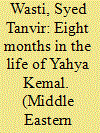

|
|
|
|
|
| Publication |
2011.
|
| Summary/Abstract |
With the end of British rule in the Indian sub-continent in 1947 and the establishment of the new state of Pakistan, the traditionally close relations between the Turks and the Indian Muslims were consolidated with the appointment of Turkey's senior poet-diplomat, Yahya Kemal Beyatli, as the first Ambassador of the Republic of Turkey to Pakistan. The ageing Ambassador filled this position for eight months under difficult circumstances until after the death of the founder of Pakistan, Mohammed Ali Jinnah. Based on Yahya Kemal's letters and other available information, the article attempts to capture the atmosphere surrounding Yahya Kemal's sojourn in Karachi.
|
|
|
|
|
|
|
|
|
|
|
|
|
|
|
|
| 6 |
ID:
153595
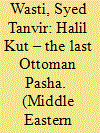

|
|
|
|
|
| Summary/Abstract |
The siege of British Indian forces by the Ottoman Army at Kut-al-Amara ın Iraq during the First World War, which ended on 29 April 1916 with the surrender of the garrison under the command of Major General Sir Charles Townshend, was an important mılıtary defeat for Great Britain. The article provides supplementary information on aspects of the 147 day long siege and surrender, based mainly on the memoirs of the Turkish General H. K. Pasha, whose forces took well over 10,000 British Indian officers and men into custody at Kut-al-Amara.
|
|
|
|
|
|
|
|
|
|
|
|
|
|
|
|
| 7 |
ID:
089117
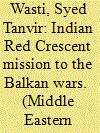

|
|
|
|
|
| Publication |
2009.
|
| Summary/Abstract |
Indian Muslim political development during the early years of the twentieth century contained a significant pan-Islamic component of solidarity, especially with the peoples of the beleaguered Ottoman Empire. Although this sentiment was later to be channelled into organized internal political activity such as the foundation of the Muslim League, it had its beginnings in various agitations such as the Khilafat Movement. The Indian Red Crescent Mission to Turkey may be said to have provided the initial mise-en-sc ne for the expression of political sympathy towards Turkey and the generation of a local freedom movement among the Muslims of India.
|
|
|
|
|
|
|
|
|
|
|
|
|
|
|
|
| 8 |
ID:
134502
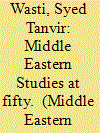

|
|
|
|
|
| Summary/Abstract |
If a monument to the success of Middle Eastern Studies as a pre-eminent journal in its chosen area were to be required, a simple glance at the list of published articles and the names of their authors over the last five decades would be sufficient to impress even the most fastidious observer. This is the journal par excellence for those who wish to understand both the past and the present of the region known as the Middle East as well as its relations with the rest of the world. The range and scope of the articles in Middle Eastern Studies is wide enough to be almost baffling to the casual reader, and it is no exaggeration to say that in the endnotes to many articles there is more substantive material to be found than is often encountered in full-length pieces published in less demanding publications. The yardstick set by the founding editor of Middle Eastern Studies, the late Professor Elie Kedourie, was that for an article to be accepted, it had to be original, scholarly, relevant and readable. Elie Kedourie's own books and articles overflowed with sound knowledge, were broad in outlook and balanced in judgement; they were compassionate even in criticism, and exuded an immaculate style and rare wit that made them literally unputdownable. Hence, all was not grist that came to Elie Kedourie's mill when it came to the publication of articles in the journal which he first made famous and which, under the continuing illustrious editorship of Sylvia Kedourie, has gone on from strength to strength. The achievement-studded past or the glamorous present address of a prospective author meant little unless the merit of the article measured up in both thought and expression to the accumulated standards of the journal. This is why acceptance of one's manuscript for publication in Middle Eastern Studies was, and continues to remain, a source of unique satisfaction to authors – it is the hallmark that certifies that their article is one of quality.
|
|
|
|
|
|
|
|
|
|
|
|
|
|
|
|
| 9 |
ID:
142758
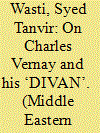

|
|
|
|
|
| Summary/Abstract |
Starting with the nineteenth century, European interest in the literature of the Middle East began to increase. Ottoman Turkish poetry, from territories that expanded into Europe, was an object of special study – as evidenced from the works of Sir William Jones, James Clarence Mangan and Elias John Wilkinson Gibb, on the one hand, and poets like Lord Byron and Thomas Moore, on the other hand. A young Frenchman, Charles Vernay, who had a gift for languages, taught himself Persian and Turkish and published a Divan – a collection of classical Oriental poetry – in Paris while still in his teens. The article traces the life and analyzes the Turkish poetry of Charles Vernay.
|
|
|
|
|
|
|
|
|
|
|
|
|
|
|
|
| 10 |
ID:
174165
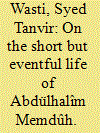

|
|
|
|
|
| Summary/Abstract |
Reforms introduced in 1839 (known as the Tanzimat) which were intended to modernize the Ottoman political and administrative structure, led inevitably to movements which introduced new literary ideas into the Ottoman cultural sphere. One of the first writers who wished to see Ottoman literature catch up with developments in Europe was Abdülhalîm Memdûh (1866 – 1905). His contributions covered the areas of poetry, prose, drama, journalism and political activism. Memdûh was not content with using classical chronicles; he published at the age of 22 the very first History of Ottoman Literature in Turkish, which served as the model for subsequent literary histories. Later, in his short life, he collaborated with Edmond Fazy, a Swiss writer, to publish a book in Paris titled Anthologie de l’amour turc, which contains Turkish love poems in French translation for the first time. This article evaluates the contributions of Abdülhalîm Memdûh in order to give him a place among the pioneers of 20th century Turkish literature.
|
|
|
|
|
|
|
|
|
|
|
|
|
|
|
|
| 11 |
ID:
073585
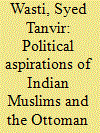

|
|
|
| 12 |
ID:
164920
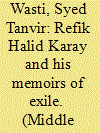

|
|
|
|
|
| Summary/Abstract |
Refik Halid Karay was a prominent late Ottoman Turkish novelist and journalist, who felt at odds with the political environment of his time and did not hesitate to attack it with his humorous and satirical pen. In consequence, he was twice exiled from Istanbul, firstly for five years within Turkey, and secondly, when he was not allowed to enter Turkey for sixteen years as one of the so-called 150ers who were deprived of their citizenship. The life and times of this quick-witted writer of elegant Turkish prose are presented around the broad framework of his two memoirs of exile. The 150ers were later granted a pardon and Refik Halid Karay returned to Turkey in 1938.
|
|
|
|
|
|
|
|
|
|
|
|
|
|
|
|
| 13 |
ID:
097787
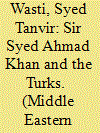

|
|
|
|
|
| Publication |
2010.
|
| Summary/Abstract |
Sir Syed Ahmad Khan was a pioneer of higher education for the Muslims of India after political power passed to the British in the nineteenth century. He was a leader who foresaw with clarity that Hindus and Muslims were bound to seek separate national destinies after the British left India. After the collapse of their own empire, the Indian Muslims aligned themselves with the Ottoman Turks and Sir Syed therefore deliberately chose Turkish models for educational, cultural and even sartorial reform. He was loyal to British rule in India mainly because, though it subdued all Indians, it simultaneously prevented the Hindu domination of Muslims.
|
|
|
|
|
|
|
|
|
|
|
|
|
|
|
|
| 14 |
ID:
130747
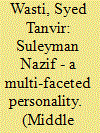

|
|
|
|
|
| Publication |
2014.
|
| Summary/Abstract |
Administrative reforms within the Ottoman bureaucracy in the nineteenth and early twentieth centuries resulted in many educated men joining the civil service. Süleyman Nazîf's father served in the Ottoman power structure for many years, but Süleyman Nazîf himself, despite being appointed to important political posts, gave them up to continue his career as a poet, writer, journalist and patriotic political commentator. Like many high-ranking Ottomans, he was exiled to Malta by the British after Turkey's defeat in the First World War. Süleyman Nazîf has also left an indelible mark on the literary milieu of his time because of his ready wit and wry humour.
|
|
|
|
|
|
|
|
|
|
|
|
|
|
|
|
| 15 |
ID:
148626
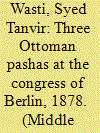

|
|
|
|
|
| Summary/Abstract |
In the weakened Ottoman Empire of the nineteenth century, revolts in the Balkans and subsequent Russian intervention led to the Russo-Turkish War of 1877 which resulted in a great loss of Ottoman territory and population in the European part of the Empire. After the ceasefire at Edirne in January 1878 and the signing of the Treaty of San Stefano in March 1878, the Congress of Berlin was convened in June 1878 in order to achieve a political settlement. High-level plenipotentiaries of the main European Powers took part in the deliberations. Against the backdrop of the Congress of Berlin, details are provided about the lives and careers of the members of the Ottoman Turkish delegation.
|
|
|
|
|
|
|
|
|
|
|
|
|
|
|
|
|
|
|
|
|